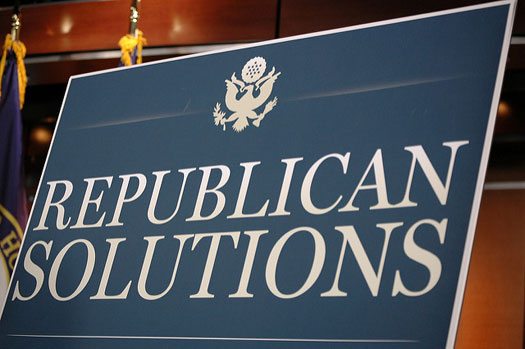
July 13, 2017; Washington Post
Nonprofits of many different types are watching the machinations in the Senate as the GOP desperately seeks some form of health care legislation capable of garnering the necessary 50 votes. Even as the current front-running bill was being released, another was introduced from the sidelines. Up for grabs in this scrum are a few things that should matter to all of us: Medicaid, taxes, and the ways they reflect the values of this country.
The Senate Budget Committee yesterday released an updated version of the Better Care Reconciliation Act (BCRA), initially introduced last month as a Senate Republican alternative to the House-passed American Health Care Act (AHCA). The intent of both the AHCA and the BCRA is to “repeal and replace” the Affordable Care Act (ACA), or Obamacare, passed in 2010. The revised BCRA released on Thursday will now be “scored” by the nonpartisan Congressional Budget Office (CBO), with results expected sometime next week. Meanwhile, Sens. Lindsey Graham (R-SC) and Bill Cassidy (R-LA) announced plans to introduce their own version of healthcare legislation.
The latest BCRA revision includes the following key changes:
- Increasing out-of-pocket supports from $112 billion to $182 billion
- Allow individuals to use the tax-free funds in their Health Savings Accounts (HSAs) to pay health insurance premiums
- Dedicating $45 billion to fight the opioid epidemic
- Tax credits would be made available to individuals purchasing catastrophic insurance policies (under the ACA, tax credits are only available to individuals purchasing comprehensive health insurance policies)
- Calculation of Medicaid reimbursements to some hospitals (so-called “disproportionate share” or DSH) would be changed from per Medicaid enrollee to per uninsured patient.
- States can apply for Medicaid waivers to “continue and/or improve” administration of home and community-based services (HCBS)
Another provision is a version of a proposal by Sen. Ted Cruz (R-TX) to allow insurance companies to offer insurance without all the coverage features required under the ACA. According to the Senate Budget Committee, the revised bill
Creates a fund for the purpose of making payments to specified health insurance issuers for the associated costs of covering high risk individuals enrolled in the qualified health plans on the Affordable Care Act’s Individual Exchange. In order to qualify for such funds, an issuer must offer sufficient minimum coverage on the Exchange that remains subject to Title 1 mandates. Offering such coverage would enable the issuer to also offer coverage off the Exchange that would be exempt from certain Title 1 mandates.
Sign up for our free newsletters
Subscribe to NPQ's newsletters to have our top stories delivered directly to your inbox.
By signing up, you agree to our privacy policy and terms of use, and to receive messages from NPQ and our partners.
NPQ has written about the AHCA (here and here) and the initial version of the BCRA (here and here and here) several times, and we reiterate that the key components of the initial House GOP repeal and replace proposal are still included in the revised BCRA. The ACA’s individual and employer mandates are repealed, federal funds to support the ACA’s Medicaid expansion are gradually removed, and federal support for Medicaid will move to a per-person (capitation) model rather than the covered service reimbursement model currently in place. The defunding of Planned Parenthood for one year also remains in the revised Senate bill.
The proposed legislation announced by Graham and Cassidy has not yet been introduced in the Senate and no bill text is yet available. The key provision is moving decisions about health insurance to the state level and away from the federal level. In a CNN interview, Graham described the proposal as follows: “If you like Obamacare, you can reimpose the mandates at the state level. You can repair Obamacare if you think it needs to be repaired. You can replace it if you think it needs to be replaced. It’ll be up to the governors. They’ve got a better handle on it than any bureaucrat in Washington.”
CNN reports that the two senators believe the key problem with the AHCA and the BCRA is “working from the Obamacare template—particularly federal control of health insurance.” The bill is modeled after the welfare reform act passed in 1996, which was negotiated between former Sen. Rick Santorum (R-PA) and President Bill Clinton. Santorum has advised Graham and Cassidy on their proposed bill.
The Graham-Cassidy bill would retain ACA-imposed taxes affecting upper-income taxpayers, including a 3.9 percent tax on investment sales and a tax on some corporate executive compensation, but it would repeal the tax on manufacturers related to the sale of medical devices. The hope is that increased control, coupled with up to $500 billion in revenue transfers from the federal government to state governments over the next several years, will attract state-level support, especially from GOP governors in states that have implemented Medicaid expansion.
Graham and Cassidy say their proposal is complementary to the revised BCRA. “We’re going to support [Senate Majority Leader] Mitch [McConnell’s] effort with his new plan, but we want an alternative and we’re going to see which one can get 50 votes,” Graham said. “We’re not undercutting Mitch, he’s not undercutting us.”
Once the CBO report is available, the unpredictable math on Senate passage of the BCRA kicks in. McConnell needs at least 50 votes (plus Vice President Pence to break a tie) in order for the Senate to even consider the bill, much less amend it and vote on it. The failure of the initial draft of the BCRA to meet this threshold is what sparked the development of the revised BCRA. Now we get to see whether either the revised BCRA or Graham and Cassidy’s proposed state-based model can get a hearing on the Senate floor.—Michael Wyland













